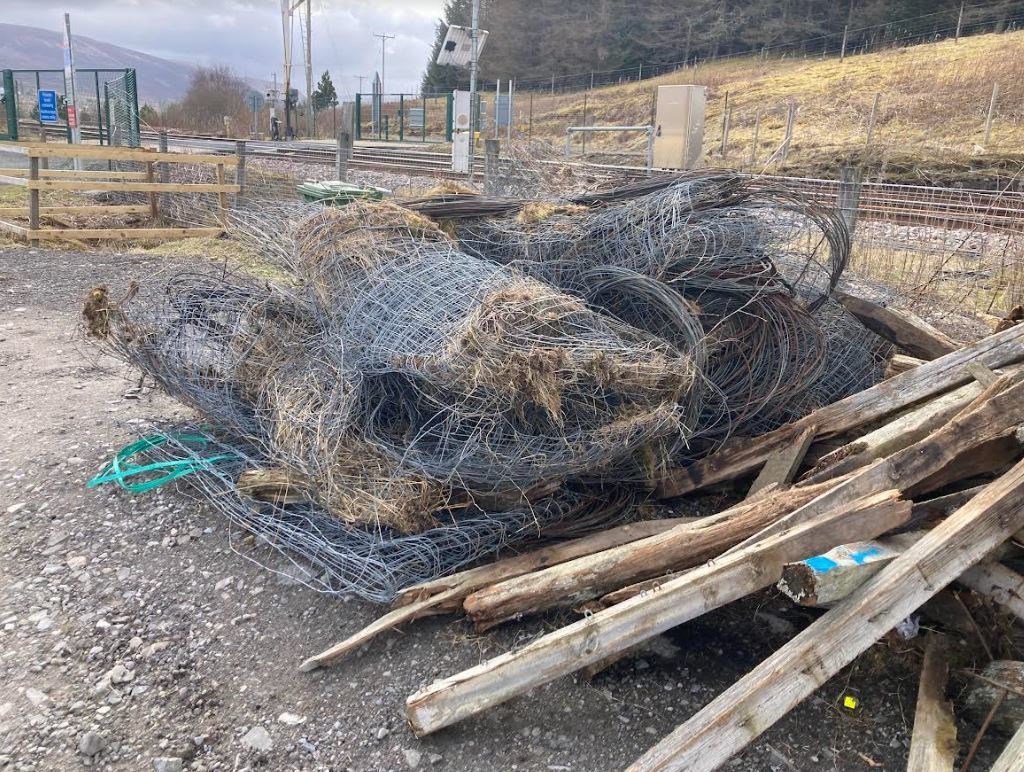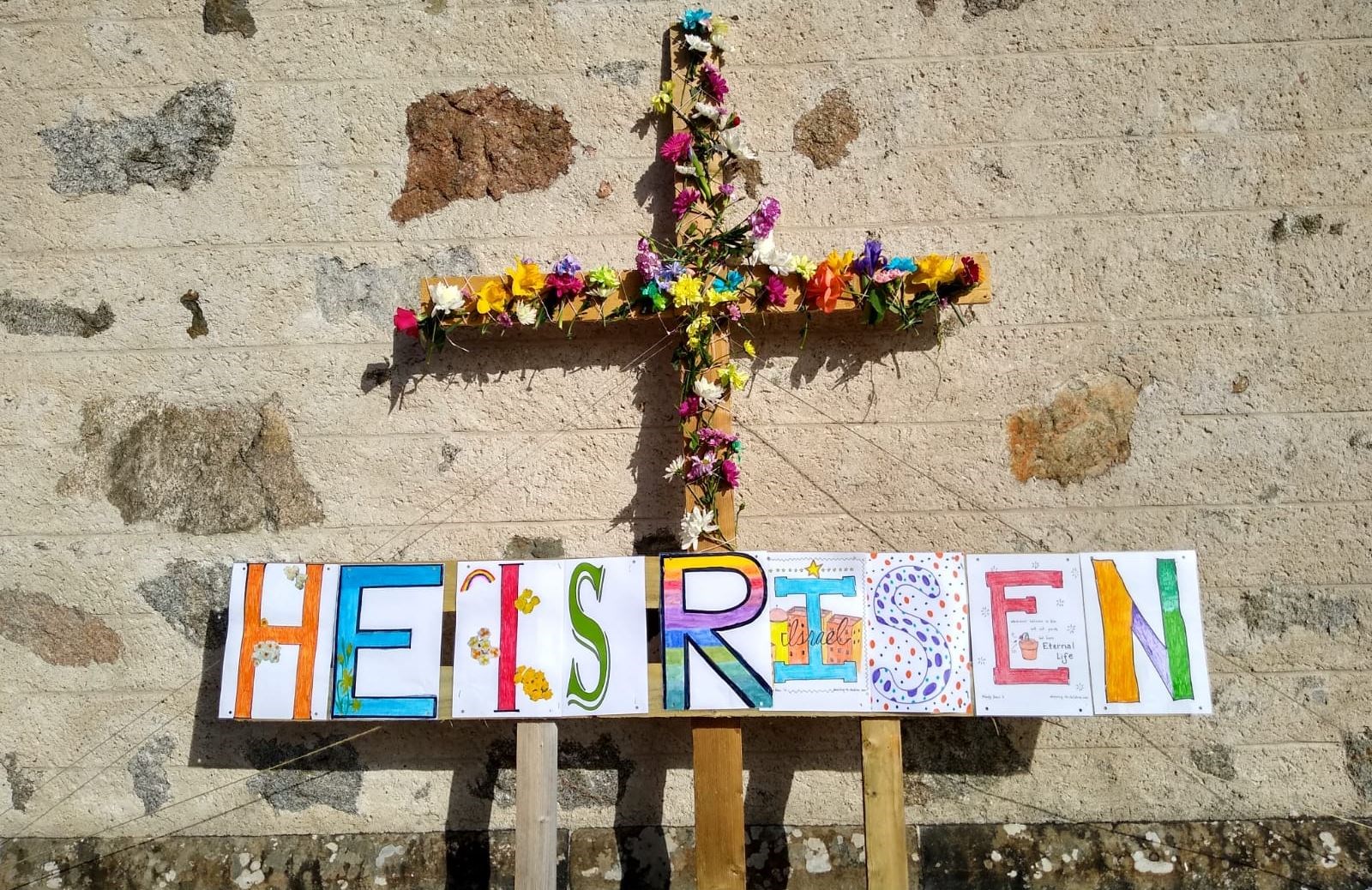YOUR VIEWS: ‘Network Rail is fly-tipping in our village car park’
Click here to sign up to our free newsletters![1]

The waste in this photo has been left by Network Rail for a number of weeks at the Ben Alder crossing hillwalkers car park in Dalwhinnie. It is land that does not belong to Network Rail and it has no rights other than for rail line maintenance access. We are asking them to stop fly-tipping their waste in our community.
We understand this has come from six miles up the track where there were working using the Ben Alder rail crossing as access. The waste has been left here for more than two weeks at this point of writing. It just compounds the frustration felt by local residents now actively stopped by Network Rail from parking in a perfectly good car park following their unilateral closure of the long-standing access.
Over Easter weekend Network Rail even employed a contractor to direct people away from the car park towards the underpass or over the pedestrian bridge at the station and across private land they had no right to send people over.
This caused visitors to park all over the village blocking laybys and including up and along Station Road rather than in the car park at the crossing. Whether it was intentional to stop people using the car park or not this was the result of their actions and their actions alone. The fact Network Rail is employing a contractor to manage the crossing on busy weekends only highlights they know there is a bigger issue here that they have created at huge expense.
Numerous complaints have been received from residents on Ben Alder Road, Station Cottages and Station Road regarding the parking situation over the past week, let alone regarding the fly tipped waste Network Rail and its contractors seem to believe they have the right to leave at a public car park area.
We would urge Network Rail to stop its inconsiderate behaviour towards our community local landowners and businesses already struggling with their access to Ben Alder Estate being cut off due to their arrogance and ignorance. We will be ensuring all stakeholders including the landowner of part of the car park, Highland Council - managers of the adopted road at the car park - and the Cairngorms National Park Authority are made aware of this fly-tipping.
We also hope Network Rail will start to work with the Dalwhinnie community and other stakeholders on a solution to reinstating the Drovers Road access that pre-dates the railway. Jen Dickinson
Chairwoman of Dalwhinnie Community Council Dalwhinnie. * * * *
Live local but do think global plea I strongly disagree with the petition that Aileen Jackson in her letter of April 13 (Our Communities need bigger say on wind turbine) wants us to support. It asks for Scottish communities to have the same power as in England, that has effectively stopped new wind farms there.
Wind farms generate renewable electricity, so reducing carbon emissions that are the largest reason for global warming. The Intergovernmental Panel on Climate Change (IPCC) urges immediate, rapid and deep reduction in carbon emissions. Overshooting 1.5?C of global warming will irreversibly damage the natural world and places where people can live.
Antonio Guterres, UN Secretary- General, says that 'Under current policies, the world is headed for 2.8?C of global heating by the end of the century ... a global catastrophe'. The IPCC reports that policies that have actually been implemented are heading us towards 3.2?C by 2100. There would be massive extinction of species and millions more people forced to abandon their homes across the developing world.
There would be mass migration to cooler regions such as the UK. Wildfires would devastate much of our forests and heaths. Local objections are the biggest block to increasing renewable energy in the UK.
Yes, local interests must be listened to but local views should be balanced with others' welfare and right to life. Carbon emissions will affect future generations more than us today. Stopping a single windfarm may make relatively little difference to global emissions.
But together objections jeopardise the climate and biodiversity. Expecting the rest of the world to solve the climate crisis is indefensible. I enjoy the natural beauty of our hills, but recognise a moral obligation to leave a world fit for future generations.
Please think carefully before supporting this petition. Dermot Williamson Kincraig.
* * * * The story of Easter(s)

Having two calendars to work from when trying to calculate Easter results in it being called a 'moveable feast.' This is because the Church tries to keep the event close to the date of Passover, but not actually on it, as it chooses to celebrate on the closest Sunday to it.
The Celtic Church in Britain and Ireland commemorated the crucifixion on the actual date of Passover on Nisan 14th in the Biblical calendar, rather than tying it to a day of the week. This changed at the Synod of Whitby in 664. There were two Sabbath rest days during the week of Passover, the regular weekly Sabbath on Saturday, plus the annual Sabbath of the First Day of Unleavened Bread on Nisan 15th.
But most people seeing the word 'Sabbath' assume it to be a Saturday. It is counting from the day before the weekly Sabbath, which would be Friday, that gives the well known Friday to Sunday time frame. However, John 19:31 describes the Sabbath, before which Jesus had to be taken off the cross, as a "high day."
So it was actually the Annual Passover Sabbath, and not the weekly Sabbath that the Bible cites. This can fall on any day of the week. The Gospels nowhere state Friday, but only the term Preparation Day, which precedes both the weekly and annual Sabbaths when they occur.
The first visitors came to the tomb on Sunday morning to discover it to be empty, but no one saw the resurrection taking place. That took place some time before their arrival. All Biblical days start and end at sunset, so Jesus had to be put in the tomb before the onset of the Annual Sabbath at sunset, due to Jewish ritual law.
Jesus said that He would be three days and three nights (72 hours) in the grave, so He would need to rise just before sunset, not at sun-rise, 72 hours later. The only point before the first visitors coming that would be at that time would be just before sunset on the weekly Sabbath just before the onset of Sunday, but not actually on Sunday itself. Count back 72 hours and it reveals Wednesday to be the crucifixion day, not Friday, as is so often assumed.
This means that Yeshua (His given Name) actually rose on the Sabbath, making Him Lord of the Sabbath, but not of Sunday at all. All because of conflating two different Sabbaths. It does not affect any other details of the story, but will the Church accept this anomaly?
We should not pass over Passover, as "Christ is our Passover, therefore let us keep the feast." Colin Nevin (Address supplied)
* * * * Scots prosperous in UK? Now that's rich
So Mr Wardrop thinks Scotland is more prosperous as part of the UK (Strathy letters, April 13). Really? Tell that to the swelling numbers of food bank users.
Has he noticed that the UK now sits at the bottom of all economic league tables of the world's major developed nations, except two - inflation rate and Covid death rate? Is that prosperity? UK productivity is at the bottom of that international league table as well.
How, then, is it going to export anything to generate prosperity now that we've left the EU? Finally, he suggests that Scotland would be in poverty without the Barnett formula. Where does he think that money comes from in the first place?
It's Scotland, of course. We send all our income tax, corporation tax, vat and national insurance revenue south and get an average of 60 per cent back. How magnanimous of them to let us have back so much of our own money!
Has he not realised how much more prosperous an independent Scotland would be if we didn't send all of our earnings south and kept it all here? No, Mr Wardrop, Scotland is not more prosperous as part of the UK. Alan Anderson
Portlethen.
Do you want to respond to this article?
If so, click here[2] to submit your thoughts and they may be published in print.
References
- ^ Click here to sign up to our free newsletters! (www.strathspey-herald.co.uk)
- ^ here (www.strathspey-herald.co.uk)